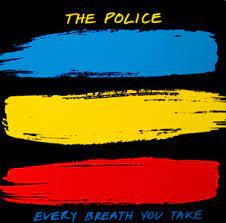
This is the big one, folks, or at least one of the very biggest. Go back to this very week, 40 years ago, and the summer of Synchronicity--the fifth, last, and best album by The Police--exploded onto America's airwaves, with "Every Breath You Take" leaping into the Billboard Top 40 the very first week of its release, rushing quickly to the #1 spot. The Police arrested us, and it was weeks before we were finally let go.
1983, as I argued at the beginning of this series, can be seen in retrospect as the year when all sorts of urban, technological, cosmopolitan, racially and sexually mixed tropes and beats, various styles and instrumental tricks that had been percolating for years in the clubs of Great Britain and the discos of New York and elsewhere, finally and truly broke through and redefined pop radio in America. The face of that transformation--a transformation that woke up MTV to what increasing numbers of young Americans were actually listening to--was, of course, Michael Jackson, the 1970s R&B star whose Thriller was the biggest album of the year: 22 weeks at number 1 in sales, and the Grammy winner of Album of the Year. Yet right behind that product of the funky, multi-racial American stew which was disco? The Police--and this terrific, creepy, beautiful song crafted by that post-punk, post-reggae, New-Wave-Before-New-Wave trio actually peaked longer than any of Thriller's hits, lasting a full two months at #1, and winning Song of the Year the same year Jackson took home the album title. If any single pop record defines 1983, it's probably this one.
The Police are hard to fit into my thesis, it's true; it's more like they oversaw it from above, or from the side. As Tom Breihan once wrote, The Police "messed around with synths, but they were never synthpop. They rode the wave of punk, but they were never punk. They weren’t prog either, but they’d been schooled in prog, and people who cared about such things could revel in their sophisticated musicianship. The Police were perfectly at home in arenas and stadiums, and they made big, echoing, open-chord rock songs that resonated far and wide. They were new, but they weren’t too new." Possibly similar sorts of things could be said about Elvis Costello, The Pretenders, Joe Jackson, Talking Heads, The Clash, Blondie, and more. These were all pop and rock performers that made it onto the radio after having schooled themselves in a mid-to-late-1970s era when punk and disco climaxed and began their decline, but definitely still weren't dead, and so some of their sound was constructed out of musical remnants that for most of the rest of the Second British Invasion, just a few years later, had arguably been supplanted by all the new toys coming out of dance halls of London, Paris, and Berlin. ("Born in the 50's" isn't on anyone's list as the standout track on The Police's first album, 1978's Outlandos d'Amour, but it situated them well all the same.)
Speaking of 1978, The Police are one of only five acts--two others of which were mentioned in the above paragraph--who threaded the American pop radio needle in such a way as find a home not just on the Billboard charts, but also my radio-listening memories, for both this 1983 list, and my Songs of 1978 list, from five years ago. And The Police--definitely in terms of sales, but probably in terms of cultural impact as well--were the biggest of those three. The Police song from 1978 that stands out was, of course, "Roxanne." By 1983, they'd worked through whatever shared passions they'd once had for reggae and rock guitars and were instead exploring the whole world of music in utterly different directions: atmospheric jazz, classical, urban funk by way of Western Europe, and much more. Sting's strange mix of poetic and literary sensitivity, on the one hand, and contemptuous, almost clinical arrogance on the other had colored almost every note they released. And of course, by this time, they all basically hated each other, or at least Sting and Stewart Copeland couldn't even get through and interview without threatening to quit the band or bust one another in the chops:
The story of "Every Breath You Take" has often been told, and just as often retold. Originally grasped, hungrily and somewhat defiantly, by the band as their best and biggest break for pop glory, it wasn't long before The Police, as the song became omnipresent, began to dump on its arrangements, and to own up to the stalking, possessive, borderline abusive sentiment which gives the lyrics their vaguely repellent power, counter-posed against the way Andy Summers's marvelously fractured, suspended-chord guitar riff keeps drawing you in. Is it a musical masterpiece for misogynistic creepers? Sure! And as Stephen Metcalf arguably implied in his comment which helped frame my take on 1983 from the beginning, there is something in the sublimated anger, the kind of presumption, that Sting intentionally or otherwise wove into this tune which anticipated (or even incorporated?) its own backlash: the pitiless drive to make a very self-determined style of music in face of all sorts of cosmopolitan trends and changes. But originally, all this subtextual stuff that didn't stop every aspiring crooner (Ian McShane!) or post-disco wanderer (Andy Gibb and Marilyn McCoo!) from covering the song, to say nothing of Robert Downey, Jr., turning it into a hipster ballad or Puff Daddy turning it into a glorious hip-hop tribute. Because it's great 1983 song, maybe the greatest, and that's the truth. So hey, we might as well stick with the original, and enjoy.
